 HOME |
|||
BAD THINGS CAN HAPPEN |
|||
| I don’t intend to scare anyone away from towing. It’s not that difficult, but so many people are so ill prepared. When you take delivery of a new boat the dealer usually goes over everything. When you take delivery of a pontoon trailer the seller may help you check the lights but that’s often about it. More often than not it’s nothing malicious. It’s just the person helping you take delivery of the trailer may be ignorant of how trailers work. The most common cause of trailer accidents is the coupler not being securely attached to the ball. When I sell a trailer I show the customer how to feel under the coupler. I always walk around the trailer and check the lug nuts, etc. | |||
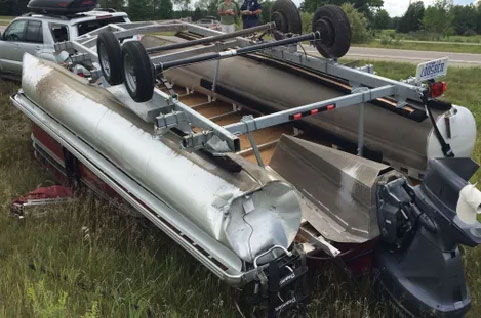 We generally say that with a tandem axle trailer you generally won’t have trouble on the road. This image is on the internet and this customer certainly had problems. The trailer is one of those light-weight narrow axle wheelbase models. It flipped. We don’t want to frighten anyone, but you’ll be the one standing on the side of the road if you have trouble. You must pay attention to what you’re getting in a trailer. A wide axle trailer (96” is best) and a trailer that weighs more than 650 lbs. would have prevented this. |
|||
 WE have tried, without actually scaring people, that towing a big heavy modern pontoon can be a serious matter. Here’s an image of a expensive pontoon with twin engines that actually turned over on an 8’ wide bunk trailer. A boat dealer suffered this loss on the way to a boat show. We have no way of knowing, but I’d bet he never gave A thought to a 6000 lb. pontoon on a 4000 lb. trailer. |
|||
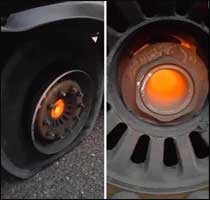 Most people know that you can run into difficulty if you don’t check the grease in the trailer wheel bearings. This image isn’t a pontoon trailer, but it could be. The wheel bearings got so hot that they actually melted, you can see the inferno inside the hub. The axle is destroyed and the heat seems to have destroyed the aluminum wheel. The owner is looking at the cost of a new axle, tire and wheel. A bit of grease would have prevented the problem. |
|||
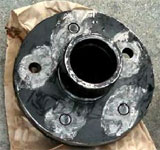 Every owners’ manual advises "check the lug nuts". Check them when you buy the trailer, again after the first 50 miles, and once again after 150+ miles. Torque them to specifications. The majority of people who tow probably never check them at all. Here’s what can happen: a couple lug nuts come loose and put pressure on the wheel studs. In this catastrophic situation, the studs broke off. You’d think that the trailer would vibrate and you would feel it in the tow vehicle, but often people who don’t check the lug nuts don’t pay attention to warning signals. The unfortunate owner of this trailer had a huge repair bill that could have been avoided by checking the lug nuts. |
|||
 |
|||
| The front axle on this trailer is crooked. It may have been installed improperly or the bolts holding the axle carriage to the frame may have come loose after a severe road shock. Hitting a big pothole can move adjustable axles. If you have a trailer with adjustable axles, you should look before every trip that the axles are “square” and you should occasionally check to see if the bolts holding the axle to the frame are tight. | |||
| Swing Tongues | |||
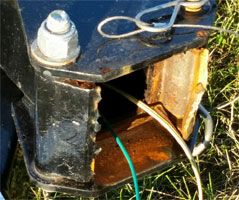 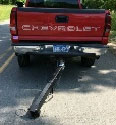 Swing
tongues are popular for
fishing boat trailers. You
save a couple of feet for
storage, in a garage.
Swing tongues weaken thetrailer tongue. On a trailer designed to carry
under 2000 lbs. it’s
probably not that important.
On bigger trailers the
tongue is an important
stress point, weakening it
with a swing tongue may not
be a good idea. Swing
tongues are popular for
fishing boat trailers. You
save a couple of feet for
storage, in a garage.
Swing tongues weaken thetrailer tongue. On a trailer designed to carry
under 2000 lbs. it’s
probably not that important.
On bigger trailers the
tongue is an important
stress point, weakening it
with a swing tongue may not
be a good idea.This is a catastrophic example of a failure of a swing tongue. The boat was Bennington 2250 which weighs probably 5500 lbs. on a 1000 lbs. trailer. That’s 6500 lbs. on a swing tongue. I can find absolutely no weight ratings on any of the swing tongues commonly sold. That is; they are sold without any rating what so even, high or low. How much weight will a swing tongue carry? No one seems to know.  We see many pontoons just sitting the trailer with no tie-downs . Here’s what can happen. Most trailers have a front loading winch to help hold the boat on the trailer and a couple straps in the back is a good idea. 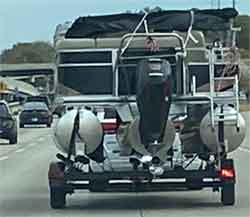 This boat is loaded crooked. Instead of the tubes being cradled in the carpeted bunks the tube centers are resting on the edge of the bunks. The owner took the time to put the stern ratchet straps on, he should have taken a look if the boat was on the bunks. Load/wind guides probably would have helped. |
|||
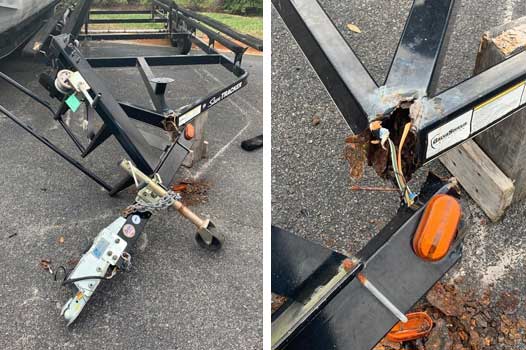 The tongue of the pontoon trailer absorbs all kinds of stress, some of the premier manufacturers use a stronger (thicker) steel in the tongue to help absorb the stress. People with larger pontoons with bigger engines really must pay attention to the trailers they buy with their pontoons. |
|||
| HOME | |||
| PONTOON TRAILERS 101 - FOR EVERYTHING YOU NEED TO KNOW ABOUT PONTOON BOAT TRAILERS | |||
